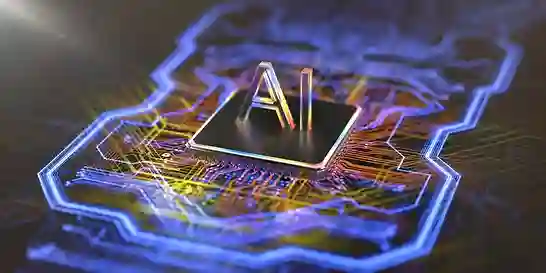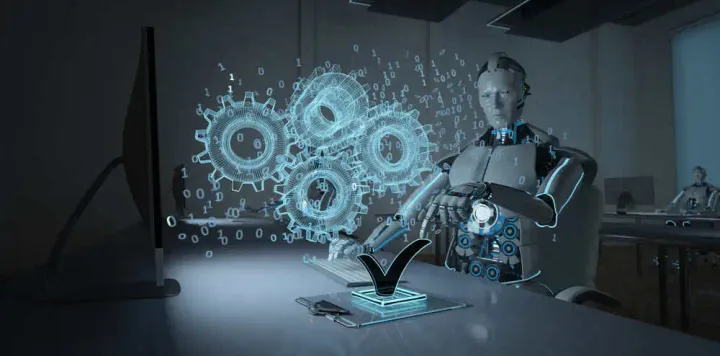The Intersection of Quantum Computing and AI: What You Need to Know
Are you curious about quantum computing and AI fusion? Look no further! This article clarifies how quantum computers and AI can advance our understanding of drug discovery, finance, and material science. Learn more about the challenges and future it holds.

Picture a day when a computer can do what is considered beyond the capability of a computer at the present day. This future is not a figment of science fiction, but rather the exciting prospect that arises from the union of two ground-breaking fields: quantum computing and AI. Quantum mechanics is the fun science behind the utilization of synchronously ducted light particles and has the potential to transform the way computation is done. As physicist Michio Kaku rightly said that
“Quantum computers will be able to crack problems that are computationally inaccessible by even the most potent supercomputers of today.”
Quantum computing competition ramped up in the last couple of years as more technology players including Google, IBM, and Microsoft invested billions of dollars in this field. Google, for instance, has moved quite far. However, it announced in 2019 that it had achieved an important development called “Quantum Supremacy” –the capacity to execute a calculation a classical computer simply could not do within a reasonable time. As found by Markets and Markets research the market which is relatively newer to the world of quantum computing is expected to surge from USD 1.3 billion in the year 2024 to USD 5.3 billion by 2029 at the CAGR level of 32.7%.
The market size increased due to the realization that quantum computing can bring transformation to different sectors. Starting from developing novel drugs to creating new financial strategies and algorithm cracking difficult encrypted codes, the uses and capabilities are endless to revolutionize our existence. But how do quantum computing and AI operate together? To know this it is time to go further and discuss the potential of the development that awaits us ahead.
Understanding the Foundations
It is important to have a basic understanding of these two revolutionary technologies before plunging into all the prospects they hold:
Quantum Computing: How it Differs From Classical One?
The arrival of quantum computing changes the view on computation capacity dramatically. Though based on binary logic (bits equal to 0 or 1), classical computers that are in use right now around the world have incredible power, yet they also have inherent problems.
The Limitations of Classical Computing
- Moore's Law: The foundation of the digitization process, which is Moore’s Law states that;
“The number of transistors on a microchip is approximately doubling every two years and appears to be at its physical limits. Miniaturizing transistors further is becoming more of a complex and expensive issue”
This very statement compels the need amongst technologists to develop a new range of computers with giant computational power.
- Computational Blockages: Just as an example, most of the critical problems involving high computational requirements like simulation of molecule structures, prediction of the nature of a system, cracking of several types of codes, etc. need computational prowess that is beyond the scope of even the largest super classical computers. Such problems include a large number of elements and interconnections that are inaccessible by classical computers.
The Influence of Quantum Computing
However, the core of the quantum computer is based on the qubit, which is an equivalent of the the classical bit. As we know that classical bits can be 0 or 1. On the other hand, qubits can be both 0 and 1 at the same time, which is due to a quantum property called superposition. It makes it possible for quantum computers to solve problems with more than one possibility at the same time, a fact that makes computations of specific types of problems several times faster.
The second important quantum property is entanglement; when two qubits occur, they are bound together, whether they are millions of light-years apart. This provides more computing power and greatly increases the influence of one qubit to change the state of the other irrespective of distance.
Despite being still in a state of infancy, quantum computers are developing at the speed of light. There are some promising architectures under research such as superconducting qubits, trapped ions, and topological qubits and each is with their own trade-off.
An Insight on Artificial Intelligence
Artificial intelligence can simply be described as the effort to develop systems or machines possessing intelligence. Artificial intelligence specifically machine learning allows for a system to train without specific programming done on it.
Here is a catch – there are some drawbacks to AI. Tuning large and deep models imposes demands on immense computational power and large amounts of time. Furthermore, typically AI algorithms are inadequate to address very difficult problems, like the determination of the optimal design of a new material or the estimation of the characteristics of complex systems.
Currently, the requirements for computations running AI systems are rapidly rising. Quantum computing, then, presents a potential solution to this steadily expanding computational puzzle.
The Intersection: Where Quantum Computing Meets AI.
Introducing quantum computing as one of the future AI platforms and using AI with the help of other platforms does help solve these limitations and open new possibilities.
Quantum Machine Learning: A New Leading edge
The most vital subfield of interest is quantum machine learning. This particular field is inclined to study how quantum computing can improve or speed up numerous machine learning methods.
Here are some key areas to focus on;
- Quantum Support Vector Machines: The use of Quantum support vector machines is one of machine learning’s oldest methods; its performance is bound to receive a quantum boost from quantum computing. Thus, the training of these models and the optimization of their accuracy can advantageously be delegated to quantum algorithms.
- Quantum Neural Networks: The neural network is one of the foundational model of modern AI due to the imitation of the human brain. Quantum neural networks although are currently under developed. They can perform data processing more efficiently than the quantum neural networks hence becoming efficient in areas such as image recognition and natural language processing (NLP).
- Quantum Reinforcement Learning: Another field within AI could be quantum reinforcement learning where the agent's existence learns how to make decisions based on environmental experiences also be helped by quantum computing.
Quantum technologies could mean that the exploration performed by the agents would be done with greater efficiency and therefore the solution of the given giant problems would be much more efficient.
So, the opportunities for quantum machine learning are huge. It could transform how we do problem-solving in areas ranging from drug discovery to finance.
Applications of Quantum Computing AI
As with most things that are this effective the possible uses are almost endless.
1. Drug Discovery
The development of new drugs is a rather prolonged and indeed rather intricate procedure. They hold the promise of speeding up drug discovery, too regularly simulating the specific ways in which molecules interact to help researchers identify likely drug targets.
2. Materials Science
The potential of quantum computing AI is to substantially extend the existing capabilities of simulation and design of new materials with improved characteristics. This could therefore pave the way for new discoveries in things like battery technology, high-tech metals, and ceramics that could be used for electricity transmission, new forms of medical applications, and much more.
3. Financial Modeling
As applied to the financial sector, quantum computing AI can be a major driver to enhanced risk evaluation and investment strategies, as well as an accurate identification of frauds. To be precise, quantum AI algorithms can process a lot of data pertinent to financial sector analysis for enhanced production of accurate predictions and therefore sound decisions.
4. Artificial Intelligence
However, beyond these utilizations, the domain of quantum computing seems to be capable of greatly augmenting the foundational assets of AI directly.
Quantum computers can open up a new level of efficiency for AI systems, allowing them to improve their learning potential, as well as providing them with the ability to better understand and model systems.
This may result in a better and more profound understanding of NLP predating techniques by virtue of which an AI system would be able to understand and create human language with great proficiency and sensitivity, or in robots having increased levels of self-governance mechanisms and flexibility.
Challenges and Considerations
Quantum computing AI represents an incredible opportunity for growth in the field but is not without its issues today.
-
Building Stable Quantum Computers: Quantum computing is still in its infancy and existing quantum computer solutions have to work through problems like qubit decoherence and error correction. The analysis shows that in order for the world to see more of quantum AI, it is important for scientists and engineers to build even bigger and more stable quantum computers.
-
Developing Quantum Algorithms: The optimization of quantum algorithms for AI applications is still an emerging research field, and it’s a challenge to create proper types of algorithms. Scientists are still trying to create algorithms that can take advantage of the opportunities offered by quantum computers.
-
Scalability and Integration: The incorporation of quantum computers into today’s AI systems and architectures is not an easy engineering task. Making the available quantum computing resources more available to serve the increasingly large-based AI needs will be important.
Ethical Considerations
The day when magnificent quantum computing systems are developed and deployed they are not far away from ethical questions.
- Potential Misuse: Any innovative technology can be used for ill purpose; the same is true for quantum AI. It is imperative as well to talk about threats, for example, related to the creation of artificial autonomous applications like weapons or AI as an instrument for dangerous activities.
- Job Displacement: The usage of quantum computing AI could possibly start a shift of workers across different industries which would later displace many people. Enhancing the employee’s skills within a company to cater to the dynamic market should be put into consideration in order to facilitate strategies for boosting the workforce skill level.
The Future of Quantum Computing AI
The prospects of further development of quantum AI are nevertheless quite vague.
- Emerging Trends: New interesting areas appear the ones that involve quantum annealing techniques that can be applied to optimization problems, and quantum deep learning that researches such aspects of deep neural networks as their utilization in quantum computers.
- Future Directions: Pleasantly, progress in both the physical implementation of QCs and the necessary software to support them must continue. Quantum AI’s proven potential will essentially need to be expanded and developed further for new areas including healthcare and climate change.
- Collaboration is Key: It is very necessary that future research, industry, and governments cooperate to take the field of quantum AI forward, responsibly, and in the right direction.
Conclusion
Quantum computing AI could be considered one of the main emerging technologies. Altogether it is clear that the potential gains are worth the effort despite the outstanding obstacles. Solving the technical and ethical issues as well as encouraging collaboration and the right development path, quantum AI can become a great tool to solve some of the greatest problems of humanity.
The future of AI, and thus the future of humanity, may well be closely tied to the move towards quantum computing. So we can consider the quantum era as a time of discovery, and innovation.


